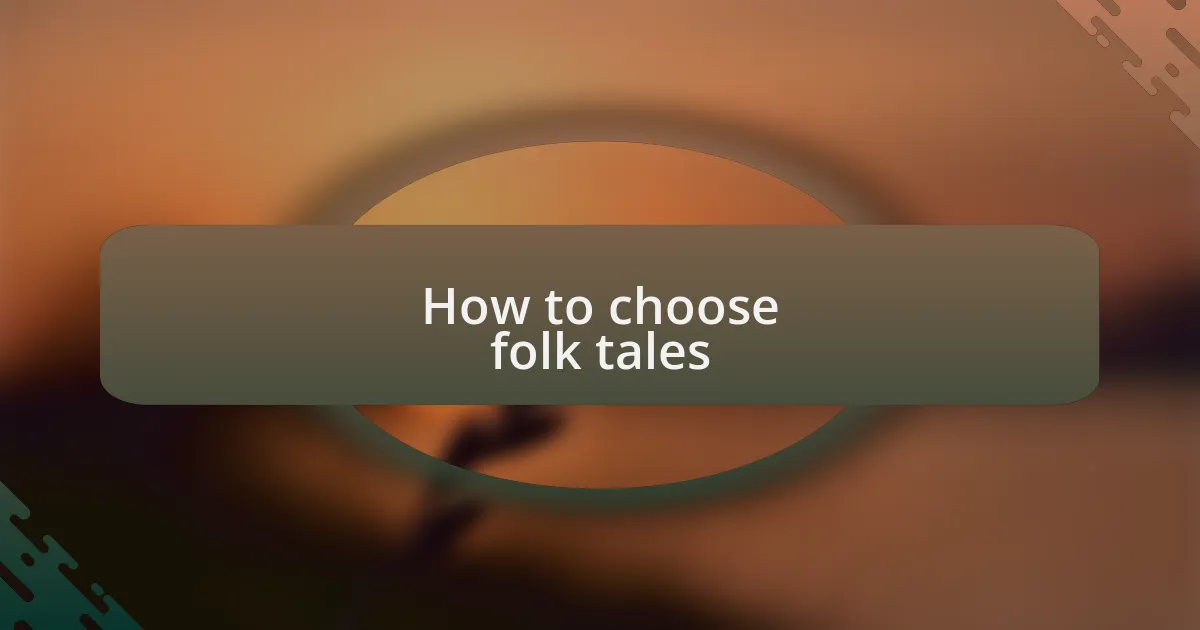Key takeaways:
- Kids storytelling engages children’s creativity and imagination, allowing them to explore complex emotions and situations.
- Storytelling plays a crucial role in child development by fostering resilience, confidence, and a sense of belonging.
- Choosing folk tales should consider the values to convey, cultural diversity, and the age and interests of the audience for maximum engagement.

Understanding kids storytelling
Kids storytelling is a magical journey where imagination knows no bounds. I remember the first time I shared a folk tale about a clever fox with my niece; her eyes sparkled with curiosity, transcending mere entertainment. Why do you think stories captivate children so deeply?
When kids hear stories, they don’t just listen—they truly engage. I’ve seen how a simple tale can ignite their creativity and provoke endless questions. For instance, after recounting a story about bravery, my nephew rushed to his toys, reenacting heroic acts with unbridled enthusiasm.
Storytelling also offers a unique way to teach values and morals. I once shared a folk tale with a lesson about kindness, and I could see the gears turning in my child’s mind. Have you ever noticed how stories resonate beyond words, allowing kids to understand complex emotions and situations in a safe space?

Importance of storytelling for kids
Stories are more than just entertainment; they play a crucial role in a child’s development. I recall sharing an age-old tale about a brave little girl who faced her fears. As I narrated her journey, I saw my daughter’s expression shift from fear to empowerment, illustrating how stories can shape resilience and confidence. Can you remember a time when a story inspired you to face a challenge?
Moreover, storytelling fosters connection and belonging. One evening, while gathered around the fireplace, I recounted a personal favorite from my childhood about family and unity. The warmth of those shared moments made me realize how stories weave family bonds, creating a sense of togetherness. Isn’t it fascinating how a single story can bring generations together, allowing us to share laughter and understanding?
Finally, storytelling enhances language skills and creativity in children. I often encourage my children to create their own endings to stories we read together. The joy on their faces as they explore their imaginations is priceless; it’s incredible to witness how storytelling nurtures their ability to express thoughts and ideas. Have you ever seen a child light up while crafting their own narrative?

How to choose folk tales
When it comes to choosing folk tales, I believe the first step is to consider the values and lessons you want to convey. For instance, I once chose a story about honesty for a gathering with my family. It sparked vibrant discussions about trust and integrity, which felt like a perfect way to impart important values while entertaining the kids. Have you ever thought about how the morals of a story can resonate differently with each listener?
Next, think about the cultural background and themes you want to explore. I enjoy selecting folk tales from various cultures to introduce my kids to diversity. Sharing a tale from another country can be a captivating experience; it’s like taking a mini-vacation without leaving home. Can you imagine the joy of uncovering a tale that not only entertains but also enlightens your children about different traditions?
Lastly, consider the age and interests of your audience. I always check the content to ensure it’s age-appropriate and engaging. For instance, my kids are fascinated by animals, so I tend to pick tales that feature clever foxes or brave lions. Have you noticed how a story’s subject can captivate young minds? Tailoring your selection to their interests makes the storytelling experience more engaging and memorable.